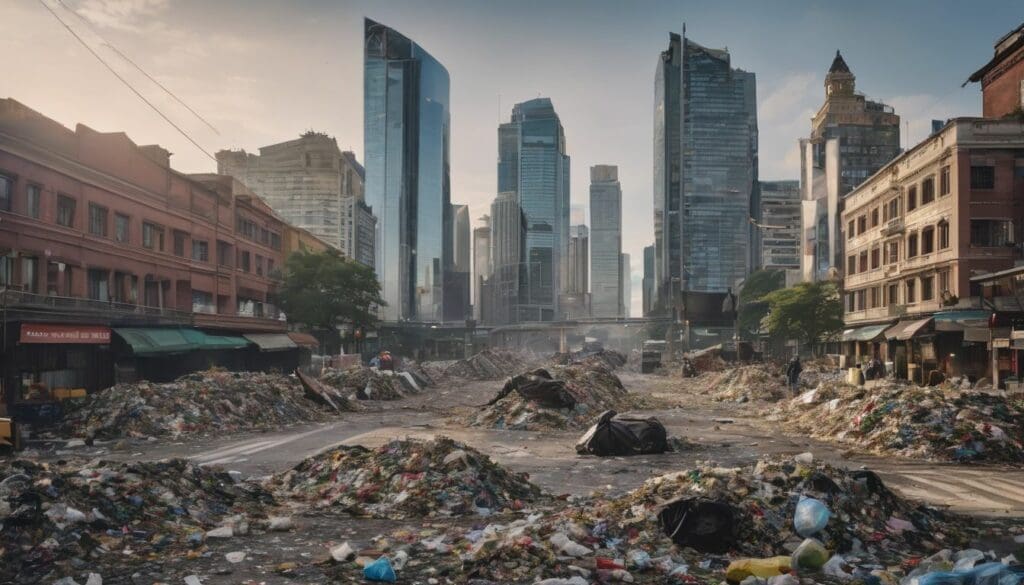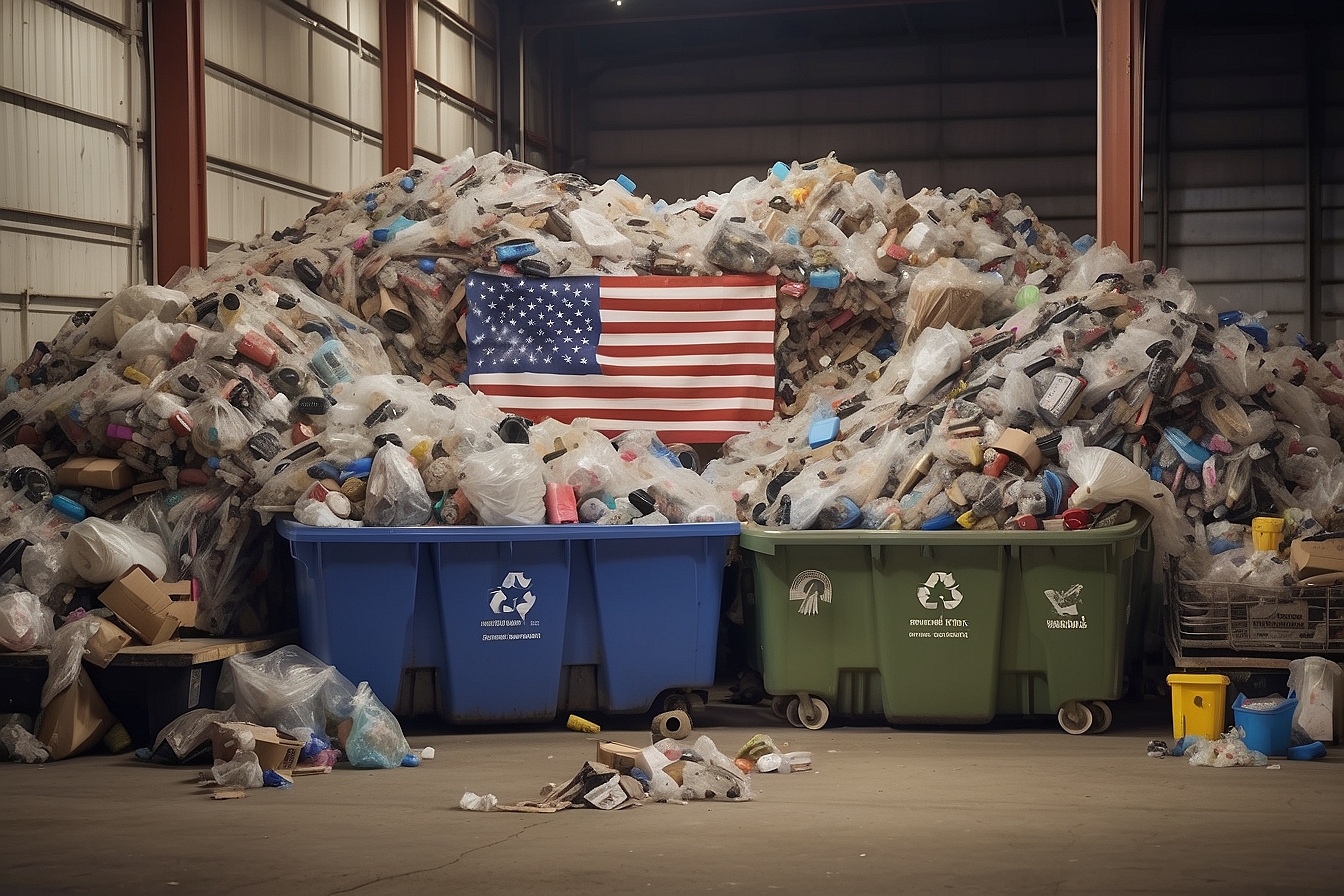As the bustle of our city life intensifies, so too does the burgeoning mound of refuse it brings—a quandary we each grapple with in the concrete jungles we call home. We’ve sifted through heaps of statistics and unearthed that every individual embedded in urbanity contributes approximately 1.2 kilogrammes of waste daily; a sobering reality that demands our collective attention.
In our forthcoming article, we delve deep into this pressing matter, presenting hands-on solutions and golden opportunities to steer urban waste management towards a more effective and eco-friendly horizon.
It’s high time we all roll up our sleeves for the sake of a tidier tomorrow!
Key Takeaways
- Cities are growing fast, leading to more trash and testing our waste management systems. Without quick action on how we collect and recycle rubbish, it could harm the environment even more.
- In many places, not everyone gets the same access to services which handle waste properly. This unfairness can cause health problems for people in poorer areas and needs to be fixed as part of making cities better for everyone.
- One big job is dealing with all the extra stuff we throw away because there are more people living in cities now. We need new ways to cut down on what we bin and find other uses for things instead of just dumping them.
- Upgrading where we chuck our waste, like landfill sites, is important too. If this isn’t done well, it can be bad for nature. Investing money into turning trash into energy could also help stop climate change from getting worse.
- Working together is key—local councils, businesses, and ordinary folk all have a part to play in sorting out city garbage problems by cutting down what they use and recycling more.
Challenges of Urban Waste Management
Rapid urban growth and population expansion present challenges in managing waste streams effectively. Inequality in access to waste management services is also a major concern, particularly in developing countries where limited technical and financial capacity can hinder effective waste management.
Rapid urban growth
Cities are expanding faster than ever, with people pouring in to find jobs and better living standards. This relentless urbanisation puts a strain on waste management systems as the volume of trash skyrockets.
We face an uphill battle in adjusting our infrastructure swiftly enough to handle the increasing loads.
Our streets feel the impact with each new high-rise and shopping centre that joins the skyline. The challenge is not just dealing with more rubbish but also preventing environmental pollution from getting worse.
As we work together for sustainable urban development, it’s critical that we evolve our waste collection practices and boost recycling programs. Only by staying ahead of rapid population growth can we safeguard the cleanliness and health of our cities.
Inequality
In urban waste management, inequality significantly impacts the efficient disposal and recycling of waste. Disparities in income and resources often result in marginalised communities bearing the brunt of poor waste management practices.
This leads to environmental degradation and health hazards for these vulnerable populations. Furthermore, unequal access to recycling facilities and education perpetuates the cycle of waste mismanagement, hindering progress towards sustainable urban development.
As we explore solutions for urban waste management challenges, addressing inequality must be a key priority. Prioritising equitable distribution of resources and implementing inclusive policies will contribute to more effective solid waste management across diverse urban landscapes, creating healthier environments for all residents.
Waste generation
Urban areas face significant challenges in waste generation due to rapid population growth and consumption patterns. The rise in urbanisation has led to a surge in waste production, putting immense pressure on existing waste management systems.
As cities expand, so does the volume of solid waste that needs to be collected, treated, and disposed of responsibly. Without efficient strategies for reducing waste generation and increasing recycling rates, cities will struggle to keep up with the growing demand for effective waste management.
To better address these concerns and ensure sustainable urban development, it is imperative to prioritise initiatives focused on waste reduction and material recovery. Through collaborative efforts between local governments, businesses, and communities, we can implement innovative solutions that lead to a more circular economy while minimising the impact of urban waste on the environment.
Infrastructure
To effectively address the challenges of urban waste management, improving infrastructure is crucial. Upgrading landfill sites and waste disposal facilities, enhancing recycling programmes, and investing in sustainable waste segregation systems are essential steps towards sustainable urban development.
Adequate infrastructure not only ensures efficient waste collection and disposal but also supports resource recovery initiatives, contributing to a more eco-friendly approach to solid waste management.
Furthermore, investing in technical capacity for engineered landfills and waste-to-energy initiatives can significantly reduce the environmental impact of municipal waste management.
Solutions and Opportunities
We will discuss resource recovery and grassroots innovation, place-based informal and organised recycling, engineered landfills and waste-to-energy initiatives as well as the changes needed to improve waste management.
Join us in exploring these sustainable solutions for urban waste management challenges.
Resource recovery and grassroots innovation
Urban waste management challenges in cities can be mitigated through resource recovery and grassroots innovation. Here are some solutions:
- Individuals and communities can engage in composting organic waste to produce nutrient-rich soil for gardening and farming, reducing the amount of waste sent to landfills.
- Encouraging the use of reusable products such as bags, containers, and bottles can significantly reduce the generation of single-use plastics that contribute to urban waste management issues.
- Innovations in recycling technologies can enable the extraction of valuable materials from electronic waste, contributing to a more sustainable approach to resource recovery.
- Community – led initiatives for upcycling and repurposing materials can divert items from landfills while fostering creativity and sustainability within urban areas.
- Supporting local businesses that implement environmentally friendly packaging practices can reduce the amount of non-recyclable waste entering urban environments.
Place-based informal and organised recycling
As we consider resource recovery and grassroots innovation, it’s crucial to recognise the impact of place-based informal and organised recycling. Here are some effective approaches that can contribute to sustainable urban waste management:
- Community Recycling Centres: These facilities provide convenient drop-off points for residents to separate and deposit recyclable materials, promoting a culture of environmental responsibility at a local level.
- Integrated Waste Management Systems: Collaborative efforts between municipal authorities, businesses, and community organisations help streamline collection, sorting, and processing of recyclable materials to minimise waste sent to landfills.
- Education and Outreach Programmes: By raising awareness about the importance of recycling and providing guidance on effective waste segregation, these initiatives empower individuals and communities to take proactive steps in reducing their environmental footprint.
- Incentivised Recycling Schemes: Implementing reward-based programmes or deposit return systems encourages active participation in recycling efforts while fostering a sense of accountability among residents.
- Public-Private Partnerships: Engaging private enterprises in establishing efficient recycling infrastructure can enhance collection networks, boost material recovery rates, and drive innovation in sustainable waste management practices.
- Upcycling Initiatives: Encouraging creative repurposing of discarded materials through workshops or community events not only reduces landfill burden but also promotes the concept of circular economy within urban areas.
Engineered landfills and waste-to-energy initiatives
Changes needed to improve waste management
To improve waste management in urban areas, we must prioritise policy initiatives that promote sustainable practices. Investing in modern infrastructure for waste collection and disposal is crucial, along with enforcing regulations to reduce illegal dumping.
Furthermore, promoting public awareness and participation in recycling programmes can significantly reduce the volume of waste sent to landfills.
Supporting local initiatives for resource recovery and innovating grassroots recycling methods enhances the efficiency of waste management systems. Additionally, integrating informal and organised recycling efforts within communities fosters a more comprehensive approach to dealing with urban waste disposal challenges.
Conclusion
Addressing urban waste management challenges in cities demands collaborative efforts. Developing sustainable waste management solutions requires innovative approaches and strong commitment from all stakeholders.
We must prioritise resource recovery, invest in infrastructure, and promote responsible consumer behaviour. Only through collective action can we effectively tackle the complex issues of urban waste management for a cleaner future.
FAQs
1. Why is urban waste management a policy priority in cities?
Urban waste management is essential because it tackles waste disposal issues and keeps our cities clean.
2. What are the main challenges of managing solid waste in urban areas?
The biggest problems include finding ways to effectively collect, sort, and dispose of increasing amounts of solid waste.
3. How do cities address urban sanitation and garbage collection difficulties?
Cities create advanced systems for regular trash pickup and work on improving urban sanitation facilities to deal with these challenges.
4. Can there be solutions to municipal waste management struggles?
Yes, by using innovative strategies for recycling and reducing rubbish, we can tackle municipal waste management challenges head-on.
5. What makes disposing of trash tough in busy city settings?
Crowded spaces make it hard to manage heaps of rubbish, which requires smart solutions for efficient solid waste disposal.





